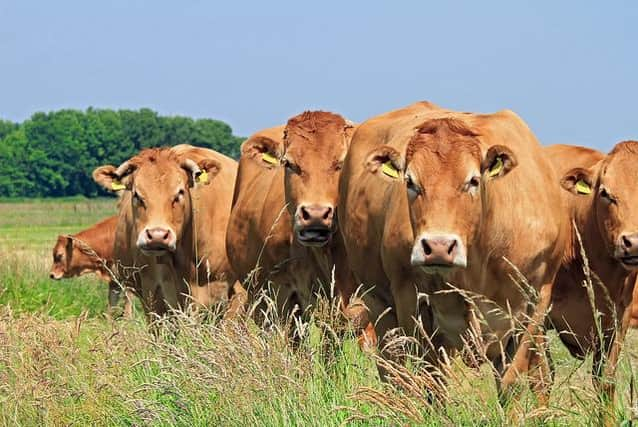Farming - We need clarity over monitoring greenhouse gas


And, with the UK hosting both the G7 Summit in June and the COP26 climate change conference in November, farmers yesterday called on the UK governments to lead the way on meaningful greenhouse gas accounting.
In a paper published by the farmer-led think tank, the Commercial Farmers Group (CFG), all four nations of the UK have been called on to urgently adopt a dual carbon accounting approach – using two different models side-by-side.
Advertisement
Hide AdAdvertisement
Hide AdIt says this approach will help cattle and sheep farmers manage methane outputs better and even provide offsetting opportunities for other industries.
The call comes as a new United Nations report on the potential for methane mitigation, which stated that although tackling emissions from the waste sector could allow the greatest progress in Europe, curbing livestock emissions also presents opportunities. But added that the potential benefits were hard to measure as estimates varied significantly.
Andrew Loftus, Yorkshire farmer and member of the CFG steering group, said the lack of suitable accounting methods made the outcome even less clear.
“It means the UK livestock industry cannot access accurate and consistent feedback on the real warming impact of methane emissions and the success of different mitigation efforts.”
He said the commonly used ‘GWP100’ accounting method was reliable for measuring emissions of gases which lasted and accumulated over hundreds or thousands of years – such as CO2 and nitrous oxide - but that it did not work for short-lived ‘biogenic’ methane from ruminant livestock,.
“This is methane that is belched when the animals digest forage, broken down after only 12 years into water and CO2, then locked back up by pasture and forage crops through photosynthesis – a completely different proposition from, for example, CO2 produced from burning fossil fuels. That’s why we need a different way of measuring methane’s impact,” said Loftus.
The alternative mode, developed at Oxford University, exists to address this problem, known as GWP*. The approach reflects the true warming impact of individual gases – in particular those of short-lived climate pollutants such as methane.
“New Zealand has already led the way in adopting GWP* alongside GWP100, but the concept has not yet gained wider traction,” said Loftus who said while the science behind the approach was widely accepted, it was inertia to move away from the status quo which was hindering progress.
Advertisement
Hide AdAdvertisement
Hide AdProfessor Myles Allen of Oxford Martin School at University of Oxford, whose team developed GWP*, has highlighted the importance of using the correct measures to achieve the required results.
He said that climate change targets could be addressed in terms of metric-equivalent emissions or in terms of warming-equivalent emissions. And he warned: “Achieving climate neutrality in terms of metric-equivalent emissions could mean eliminating practices, such as ruminant agriculture, that are not actually causing global warming.
"Warming-equivalent emissions [such as GWP*] resolve this problem.”
Comments
Want to join the conversation? Please or to comment on this article.